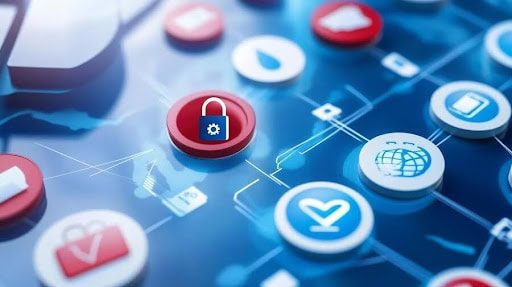Social media platforms have seamlessly integrated into daily life, serving as outlets for self-expression, news consumption, and staying connected with friends and family. But with these conveniences come significant risks. As of 2023, around 4.89 billion people actively use social media worldwide, which also makes it a goldmine for cybercriminals seeking to exploit personal data.
Safeguarding your information on these platforms is crucial to avoid identity theft, financial fraud, or even stalking. In today’s digital world, understanding how to protect your personal information on social media is no longer optional—it’s essential.
Understand and Adjust Your Privacy Settings
Most social media platforms provide robust privacy settings, but they’re only effective if you use them wisely. Begin by reviewing your privacy controls on each platform you use, whether it’s Facebook, Instagram, LinkedIn, or any other. For instance, did you know that 53% of social media users have never adjusted their privacy settings? This leaves them vulnerable.
Customization is key here. You should specify who can view your posts, friends list, and personal profile details, ensuring that only trusted individuals or connections have access to sensitive information. By tightening these settings, you immediately reduce your risk of exposing unnecessary personal data to the wrong audience.
Be Cautious About What You Share
It’s tempting to share life updates or post photos that reflect your current activities, but oversharing can lead to unintended consequences. Revealing too much—such as your home address, phone number, or frequent locations—can make you an easy target for criminals or hackers. Avoid disclosing your daily routines, as patterns can be easily tracked.
Additionally, posting real-time updates that expose your whereabouts could put your physical safety at risk. It’s smarter to use a VPN when connecting to social networks to protect your online identity and hide your location. This is especially true for less protected minorities, such as LGBTQ+ and specialized dating sites like Grindr. This is where VeePN for Grindr security comes in, which is also suitable for any social network. Also, don’t forget to use the built-in security features provided by the app. Therefore, think twice before sharing details about upcoming vacations or checking in to your favorite coffee spot.
Enhance Account Security
Weak passwords are like unlocked doors. Cybercriminals exploit this vulnerability, yet 40% of people still use simple, easily guessable passwords like “123456” or “password.” Creating strong, unique passwords for each of your social media accounts is fundamental. Combine letters, numbers, and special characters to make your password more secure. Moreover, enabling two-factor authentication (2FA) is a critical step that adds an extra layer of security. With 2FA, even if a hacker obtains your password, they would still need the second verification factor, such as a code sent to your phone, to gain access to your account.
Beware of Phishing Attempts and Fake Profiles
Phishing attacks, where cybercriminals trick you into sharing sensitive information, are common on social media. Fake accounts and suspicious links are often used to lure unsuspecting users. In fact, 22% of social media users have reported encountering phishing scams.
Recognizing these traps is vital for maintaining your security. Always scrutinize messages from unfamiliar contacts, and if someone sends you a link, hover over it to check if the URL looks legitimate before clicking. Additionally, avoid providing personal information or financial details to people you don’t know well. Suspicion is your best defense in these cases.
Use Public Wi-Fi Safely: The Role of a VPN
Public Wi-Fi networks, such as those in cafes, airports, or shopping malls, pose another serious threat to your social media security. These networks are often unsecured, making it easy for hackers to intercept your data. Using a VPN (Virtual Private Network) is a simple yet effective solution to protect your personal information on social media in these situations. A VPN encrypts your internet connection, ensuring that any data you transmit, including social media logins, is safe from eavesdropping. Considering that 89% of people use public Wi-Fi at least occasionally, using a VPN should be a top priority when accessing your accounts outside of home.

Staying Safe on Dating Platforms
Dating apps like Tinder and Bumble add another layer of risk because they involve interactions with strangers. A study revealed that 21% of online dating users have felt threatened by someone they met through the platform. When using these apps, limit the information you share upfront. Avoid providing your phone number, address, or financial details until you feel certain you can trust the person. Using a VPN when accessing these platforms in public spaces provides an extra layer of protection. Be on the lookout for warning signs such as requests to take the conversation off the app or demands for personal information too early.
Monitor and Manage Your Online Presence
Over time, your digital footprint accumulates—whether through old profiles, comments, or forgotten posts. Conduct regular audits of your online presence. A recent study found that 56% of internet users have outdated or unused social media accounts, which can become security liabilities. Take the time to delete or deactivate any accounts you no longer use. Similarly, removing old or irrelevant information can help reduce the chances of someone piecing together details about your life. It’s also advisable to use search engines to check what personal information is publicly visible about you.
Conclusion
Maintaining your privacy on social media is an ongoing process that requires vigilance. To effectively protect personal information on social media, regularly adjust your privacy settings, limit what you share, strengthen your account security, and be mindful of the platforms you use. These practices can significantly lower the risks associated with online socializing. In an age where data breaches and identity theft are on the rise, protecting your personal information is not just important—it’s essential for peace of mind.

